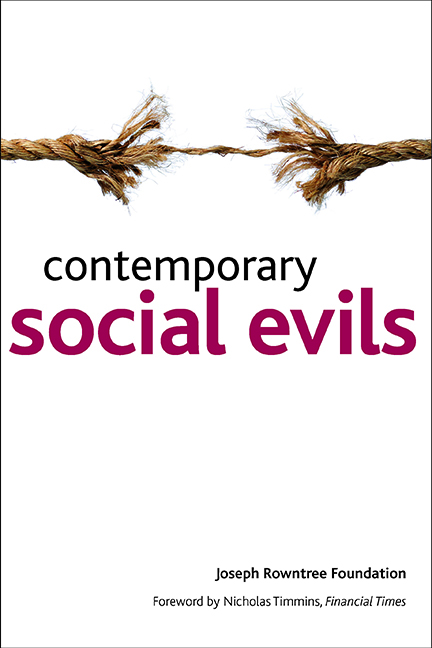Book contents
- Frontmatter
- Contents
- Foreword
- Acknowledgements
- Notes on contributors
- 1 Introduction
- 2 ‘Social evils’ and ‘social problems’ in Britain since 1904
- Section 1 Public Voices
- Section 2 Viewpoints
- A decline of values
- Distrust
- The absence of society
- Individualism
- Inequality
- Section 3 Reflections
- Appendix: How the ‘social evils’ consultations were organised
- Index
4 - Truncated opportunities: eliciting unheard voices on social evils
Published online by Cambridge University Press: 26 January 2022
- Frontmatter
- Contents
- Foreword
- Acknowledgements
- Notes on contributors
- 1 Introduction
- 2 ‘Social evils’ and ‘social problems’ in Britain since 1904
- Section 1 Public Voices
- Section 2 Viewpoints
- A decline of values
- Distrust
- The absence of society
- Individualism
- Inequality
- Section 3 Reflections
- Appendix: How the ‘social evils’ consultations were organised
- Index
Summary
The public online consultation described in the previous chapter was successful in eliciting a range of challenging opinions about contemporary ‘social evils’. Even so, it was acknowledged from the outset that individuals without ready access to the internet could be excluded from such a dialogue. These, by definition, were likely to include many people from low-income and disadvantaged groups whose voices are often neglected in debates about the condition and direction of society. To address this, the Qualitative Research Unit at the independent research organisation, NatCen (National Centre for Social Research), was commissioned to organise a series of discussion events so that a range of these potentially ‘unheard voices’ could be elicited.
The priority was to include those people least likely to have heard about the initiative and those least likely to take part without a specific attempt to reach them. With this in mind, the following groups were identified:
• people with learning disabilities;
• ex-offenders;
• carers;
• unemployed people;
• vulnerable young people;
• care leavers;
• people with experience of homelessness.
The choice was also informed by an analysis of the types of people who were participating in the online consultation. This revealed low numbers of young people and people from black and minority ethnic (BME) groups. Although the project did not start with the notions of ‘social exclusion’ or ‘vulnerability’, most of those who took part could have been placed in either or both categories. The participants were often, consequently, people with direct experience of many of the social evils that respondents to the online consultation had identified.
Altogether, eight discussion groups involving 60 people were held in locations across England and Scotland during the autumn of 2007, with participants recruited through a range of charitable organisations. (Further information about the sample and the way it was recruited is given in the Appendix.) After an open discussion about the main social evils in Britain today, people were invited to consider some of the online consultation responses and the continuing relevance of the social evils that Joseph Rowntree specified 100 years ago.
Views of ‘social evil’
The discussion of what was meant by ‘social evil’ was always lively although some participants considered that ‘social ill’ or ‘social problem’ would be a more appropriate and less emotive terms.
- Type
- Chapter
- Information
- Contemporary Social Evils , pp. 51 - 64Publisher: Bristol University PressPrint publication year: 2009



